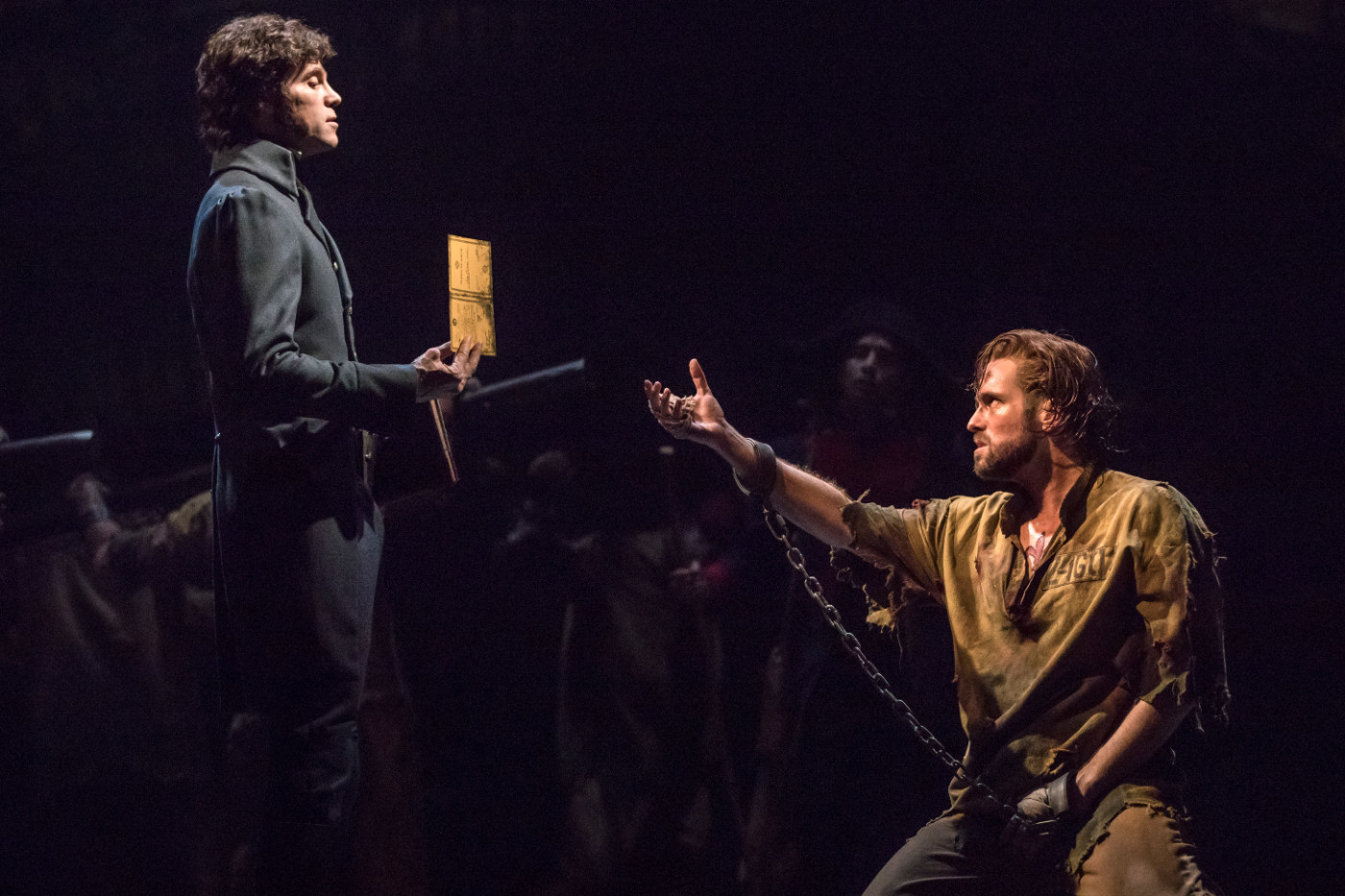Review: VOCALLY AND VISUALLY-CAPTIVATING PERFORMANCE OF LES MISERABLES at The Straz Center For The Performing Arts

LES MISERABLES is a worldwide phenomenon, the timeless musical that tells the triumphant tale of redemption of Jean Valjean, sentenced to 19 years of hard labor for stealing a loaf of bread to save a starving child. In Morsani Hall at the Straz Center on Thursday, we, the grateful audience, were transported.
Having never experienced LES MIS but as a film, directed by Laurence Conner and James Powell, Alain Boublil and Claude-Michel Schonberg's new musical version of Victor Hugo's work was, breathtaking in both visually-stunning and seamlessly-changing, elaborate tactile sets of wagons, villages, barricades, and ballrooms and matching period costumes. The thunderous orchestra was led by Brain Eads and remarkable cinematic three-dimensional projections by Fifty-Nine Production brought waves beneath a ship, Parisian streets, and sewers to remarkable life.
Though the musical was three hours long, the music was nonstop and time passed much quicker than I expected. LES MIS featured some of the most moving solos and duets, and the ensemble casts' vocals were as powerful and equally matched to the magic of Jean Valjean, Javert, Fantine, Cosette, and Marius.
Set against the backdrop of 19th century France, we first met Jean Valjean, played masterfully by Nick Cartell, being given parole by the self-righteous policeman Javert (Josh Davis). Unfortunately, with his parole came a ticket-of-leave that branded him a criminal, an outcast, at every turn. When Bishop of Digne (Andrew Maughan) was willing to lodge him, he lived up to expectations of thievery and was caught by police. The forgiving Bishop lied to the police to protect him and Jean Valjean carried that kindness with him into a new identity and broken parole 8 years later. We watched him convincingly age into factory owner Mayor Monsieur Madeleine.
Javert (Josh Davis) was still stubbornly on the hunt for Jean Valjean, despite the passage of time. He rediscovered Jean Valjean and each time he escaped his capture. You admired him for his steadfast determination, yet hated him for the same reason. Josh's performance of "Stars" where he promised to bring Jean Valjean to justice is unforgettable. When Valjean had the opportunity to kill Javert and released him instead, Javert's pride couldn't allow him to be in a criminal's debt. He sang "Soliloquy" - "I am the law and the law is not mocked... It is either Valjean or Javert," before plunging into the water, ending his life.
Another key character in LES MES was one of Jean Valjean's factory workers, Fantine (Mary Kate Moore) who worked to feed and provide medicine for her child, Cosette. When she got into a fight with another laborer, she was dismissed and forced into the streets. She sold her jewelry, hair and finally herself to save her daughter.
Mary gave a heart-wrenching performance during "I Dreamed a Dream." Like the Bishop who saved him, when Jean Valjean saw Fantine being arrested in the streets, he tried to save her. On her deathbed, he promised to instead save Cosette, the little girl Fantine died trying to raise money to protect.
The precious, young Cosette (Madeleine Guibot), enslaved by the Thenardiers, broke your heart singing about not having to sweep in "Castle on a Cloud."
The Thenardiers, the scoundrel pair and comic relief in LES MIS, sang the catchy "Master of the House," while doting on their daughter Eponine (Vivi Howard). When Madame Thenardier flirted with Jean Valjean, the uproarious laughter was well deserved.
In later years, the privileged, overprotected teen Cosette (Jillian Butler) and a student revolutionary Marius (Joshua Grosso) whom teen Eponine (Emily Bautista) secretly pined for, fell instantly in love. "A Heart Full of Love" with Cosette and Marius, revealed only to the audience Eponine's unrequited love.
Matt Shingledecker shone as the Revolutionary leader Enjolras, leading the ensemble cast at the barricades in the inspiring "Do You Hear the People Sing."
When Eponine performed "On My Own," it brought goosebumps and applause that only matched the tears that came with her death scene duet with Marius "A Little Fall of Rain." Even towards death, she fought to keep him in her life, though his heart belonged to Cosette.
When Jean Valjean realized how much Cosette felt for Marius, his powerhouse performance of "Bring Him Home" filled with resonance and vibrato, begging God to take his life during the uprising and not Marius's, it summarizes the overall theme of the musical - generosity and kindness, for the sake of being kind.
LES MISERABLES was a flawless performance, a timeless tale of grace and redemption that I am grateful I had the opportunity to experience.
Reader Reviews

Videos

